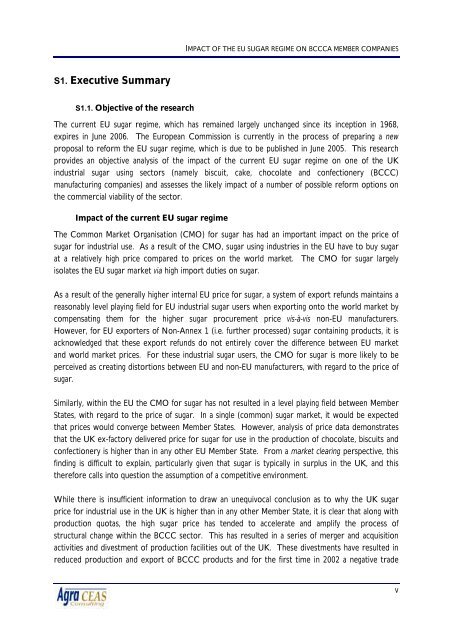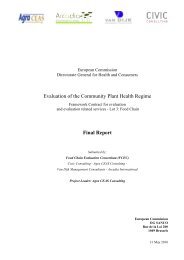2205 final report.pdf - Agra CEAS Consulting
2205 final report.pdf - Agra CEAS Consulting
2205 final report.pdf - Agra CEAS Consulting
You also want an ePaper? Increase the reach of your titles
YUMPU automatically turns print PDFs into web optimized ePapers that Google loves.
IMPACT OF THE EU SUGAR REGIME ON BCCCA MEMBER COMPANIES<br />
S1. Executive Summary<br />
S1.1. Objective of the research<br />
The current EU sugar regime, which has remained largely unchanged since its inception in 1968,<br />
expires in June 2006. The European Commission is currently in the process of preparing a new<br />
proposal to reform the EU sugar regime, which is due to be published in June 2005. This research<br />
provides an objective analysis of the impact of the current EU sugar regime on one of the UK<br />
industrial sugar using sectors (namely biscuit, cake, chocolate and confectionery (BCCC)<br />
manufacturing companies) and assesses the likely impact of a number of possible reform options on<br />
the commercial viability of the sector.<br />
Impact of the current EU sugar regime<br />
The Common Market Organisation (CMO) for sugar has had an important impact on the price of<br />
sugar for industrial use. As a result of the CMO, sugar using industries in the EU have to buy sugar<br />
at a relatively high price compared to prices on the world market. The CMO for sugar largely<br />
isolates the EU sugar market via high import duties on sugar.<br />
As a result of the generally higher internal EU price for sugar, a system of export refunds maintains a<br />
reasonably level playing field for EU industrial sugar users when exporting onto the world market by<br />
compensating them for the higher sugar procurement price vis-à-vis non-EU manufacturers.<br />
However, for EU exporters of Non-Annex 1 (i.e. further processed) sugar containing products, it is<br />
acknowledged that these export refunds do not entirely cover the difference between EU market<br />
and world market prices. For these industrial sugar users, the CMO for sugar is more likely to be<br />
perceived as creating distortions between EU and non-EU manufacturers, with regard to the price of<br />
sugar.<br />
Similarly, within the EU the CMO for sugar has not resulted in a level playing field between Member<br />
States, with regard to the price of sugar. In a single (common) sugar market, it would be expected<br />
that prices would converge between Member States. However, analysis of price data demonstrates<br />
that the UK ex-factory delivered price for sugar for use in the production of chocolate, biscuits and<br />
confectionery is higher than in any other EU Member State. From a market clearing perspective, this<br />
finding is difficult to explain, particularly given that sugar is typically in surplus in the UK, and this<br />
therefore calls into question the assumption of a competitive environment.<br />
While there is insufficient information to draw an unequivocal conclusion as to why the UK sugar<br />
price for industrial use in the UK is higher than in any other Member State, it is clear that along with<br />
production quotas, the high sugar price has tended to accelerate and amplify the process of<br />
structural change within the BCCC sector. This has resulted in a series of merger and acquisition<br />
activities and divestment of production facilities out of the UK. These divestments have resulted in<br />
reduced production and export of BCCC products and for the first time in 2002 a negative trade<br />
v













